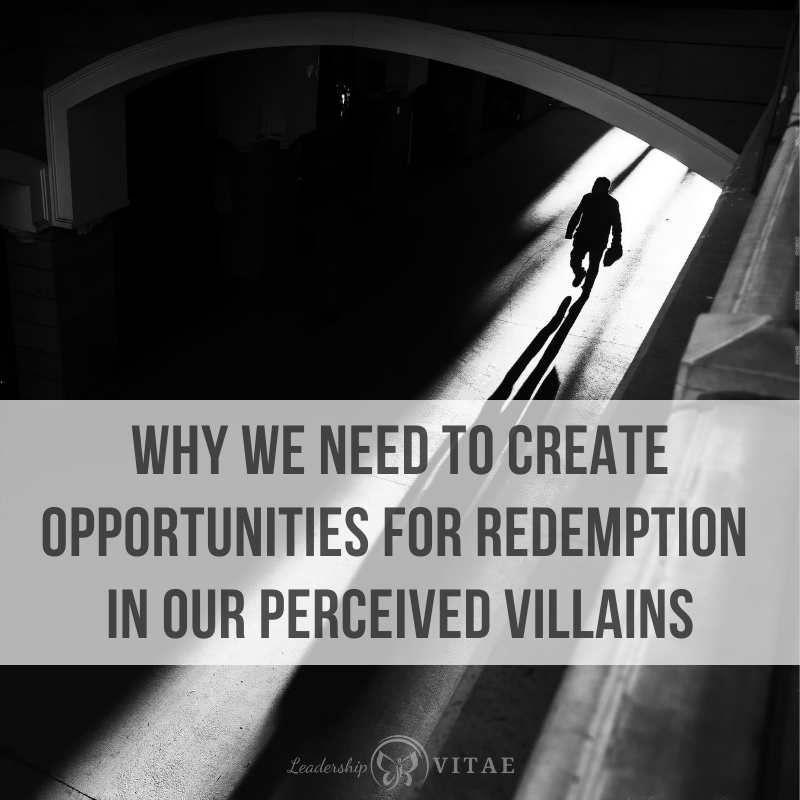
Marvel movies have been a long-time favorite. For many years, Marvel movie weekend wasn’t complete until the lesson was found and written about. It’s been a few years, and while MCU movies and shows have been a nice distraction, there wasn’t a compelling leadership lesson that stood out.
Until No Way Home. Hopefully you’ve seen it by now. If not, please stop now, as there are spoilers ahead.
.
.
.
.
Oh Aunt May. That was difficult to watch. Like many others, I’ve long wondered about the missing Uncle Ben. This time, she’s the wise adult figure, leaving a profound legacy. Yes, she dropped the famous line about responsibility. But she also taught Peter to look beyond the circumstances that may have shaped someone. To give them a chance at redemption.
In all the Spidey movies that came together in No Way Home, the villains either wanted to be seen and belong, or had grand dreams to help others that went awry. Not one dreamed of hurting people or destroying the world.
Instead, they all had inner dreams that eventually became demons that haunted them. Ones that were twisted into nightmares they spilled onto others. Not with intention, but due to extreme circumstances, almost always outside of their control.
Rarely are people all good or all bad, just human
May encouraged Peter to look past the villains’ actions and help them avoid a terrible fate. When perceived “baddies” do bad things, it’s easy to relegate them to karma and whatever outcomes we think they deserve.
But what if they deserve better? Yes, the villains, like some of the folks we may struggle with in our own narratives, did bad things. But does that make them bad people, unworthy of redemption?
Rarely will we have to suffer the way Peter suffered at the hands of a villain. But our suffering is still valid and difficult to look past.
With a bit of effort, maybe we can still move forward. Even if we can’t forgive the baddies in our lives, maybe we can put their actions in perspective and rewrite how they show up in our story.
Rarely is someone trying to harm us
A very small percentage of the population are psychopaths or sociopaths. Instead, it’s possible the perceived villains in our lives are caught up in their own issues, rather than intentionally trying to cause us harm.
Could they be getting up every morning, plotting our misery? Maybe. Yet it’s highly unlikely. Instead, we can consider their circumstances, why they are the way they are, and how we choose to receive them.
For many years, I struggled with how I was received. I have no doubt I was the bad actor at times for any number of people. It wasn’t until working with a coach that I understood the perception and how to affect a different one.
Given my own journey, I’d like to think no one is beyond redemption. That no one starts with the intention to cause harm. Yet, sometimes that’s the result, as the road to hell is paved with good intentions.
Maybe, just maybe, our villains just need someone to believe in their potential. Help them unlock or rediscover what’s good in them.
Break the cycle
We would love to think that managers see what’s happening with their employees and will help coach folks through challenging behaviors. First, we assume they know. If we aren’t saying anything, is anyone else?
Second, most managers are not taught and may have never received any form of coaching. Much of our behavior is based on what has been modeled and rewarded. Maybe we are on the receiving end of behaviors that were formed this way by current or former managers and cultures.
Our perceived villain may have good intentions and poor delivery. Assuming ill intent may create a villainous persona in our minds that is far from the actual intentions of the individual.
A “bad actor” could just be someone unaware of the impact they are having. Avoiding tough conversations perpetuates the behaviors and negative persona. Rather than continuing down that path, allowing them to eventually run into a bad end, we can have a conversation to create awareness of the impact those behaviors have on those around them.
It may take a while. If current behaviors have received positive feedback and promotions, they may think they are on the right track. Being clear on the impact of such behaviors is the best way to discover whether they are intentional (no remorse) or not (remorseful).
The next question will be whether they know how to change. We may or may not be in the best position to help, but at least awareness gets them looking for support.
Let go of anger
Let’s say the bad actor is indeed intentionally harming us. If we allow anger and resentment to boil within us, it’s damaging us more than them. First with the original behaviors, and then with the built up stress and negative emotion inside us.
Truly bad actors are a small population. Most people do not want to cause undue suffering and would be horrified to know they’ve caused harm. Which is why it’s worth trying to communicate with someone to find out if it’s really their intention. It’s possible we will find out their actions were inadvertent and we’re carrying around disproportionate levels of anger.
If our anger is warranted, bad actors won’t care about the hurt they cause. They may even delight in our misery. The only person hurt by our suffering is us. Our continued anger hurts us more than them.
Letting go of the anger, resentment, and hurt is the best path forward. If someone is truly trying to cause hurt, refusing to let it stick takes their power away. When we model a positive response to negative behaviors, we can neutralize them. A negative response fuels continued negativity.
Rewrite the story
If we’re able to help someone understand their impact and affect positive change, it’s important that we refactor their roles in our story. Rewrite the villain and not jump to conclusions in the future. Otherwise, it would be easy to narrate them back into the role of bad actor.
Whether we’ve been on the receiving end of poor delivery or true ill intent, we can do our best to create awareness, stay positive, and let go of anger and resentment. That way, we’re not giving anyone free rent in our heads.
Instead, let’s close their chapter in our lives and get busy living the next one.








